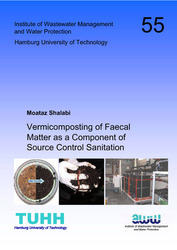| Departments | |
|---|---|
| Book Series (97) |
1381
|
| Nachhaltigkeit |
3
|
| Gesundheitswesen |
1
|
| Humanities |
2369
|
| Natural Sciences |
5408
|
| Mathematics | 229 |
| Informatics | 319 |
| Physics | 980 |
| Chemistry | 1364 |
| Geosciences | 131 |
| Human medicine | 243 |
| Stomatology | 10 |
| Veterinary medicine | 108 |
| Pharmacy | 147 |
| Biology | 835 |
| Biochemistry, molecular biology, gene technology | 121 |
| Biophysics | 25 |
| Domestic and nutritional science | 45 |
| Agricultural science | 1005 |
| Forest science | 201 |
| Horticultural science | 20 |
| Environmental research, ecology and landscape conservation | 148 |
| Engineering |
1795
|
| Common |
98
|
|
Leitlinien Unfallchirurgie
5. Auflage bestellen |
|
Advanced Search
Vermicomposting of Faecal Matter as a Component of Source Control Sanitation (English shop)
Moataz Shalabi (Author)Preview
Table of Contents, Datei (40 KB)
Extract, Datei (200 KB)
The Rottebehaelter-vermicomposting combination has great potential as a low cost component of the ecological sanitation for the treatment of faecal matter. An earth-like material rich in water soluble and thus available plant nutrients was produced from raw faecal matter after a period of 4 months due to the combined action of earthworms and mesophilic microorganisms. This concept is relatively cheap and almost maintenance free so that it can be applied in decentralized or semi-centralized scale. The substrate used in this study was faecal matter and toilet paper. However, there is also evidence from Indonesia (Prihandarijanti, 2006) of successful vermicomposting of faecal matter in wet anal cleaning culture (faecal matter without toilet paper). Two main factors are influencing the vermicomposting process: the temperature and the water content. For proper function of the vermicomposting process and to produce a stable product in a relatively short period of time, the temperature should not fall below 20°C and the water content should be in the range between 70 and 80 %. However, worms can survive conditions outside this range, but the vermicomposting process will not function efficiently. Temperature is very crucial for the success of the system. Stable and mature composts were obtained at 20°C and 25°C whereas temperatures of 15°C and 10°C have only resulted in raw composts. An unexpected result was that the control experiments (without worms) performed at 25°C and 20°C gave comparable results to the experiments with worms performed at 10°C and 15°C in terms of respiration activity, which highlights the role of the temperatures even in the absence of worms. The temperate European species used in the experiments reported in this study did not survive 30°C and died within a couple of days. But it is assumed that the tropical African and Asian species can tolerate this temperature. The temperature increase had an exponential influence compared to increasing the worm density which had a linear influence on improving the properties of the final product. In the experiments performed at 25°C nitrification occurred which resulted in a pH decrease to values around 5 in some of the experiments which seemed to be too acidic and unfavourable for the worms. When CaCO3 was added to the faecal material, the results seemed to be more promising due to its buffering capacity. But this has to be further investigated, as CaCO3 addition also seemed to enhance water removal.
| ISBN-13 (Printausgabe) | 3865379249 |
| ISBN-13 (Hard Copy) | 9783865379245 |
| ISBN-13 (eBook) | 9783736919242 |
| Language | English |
| Page Number | 176 |
| Edition | 1 |
| Volume | 0 |
| Publication Place | Göttingen |
| Place of Dissertation | Hamburg-Harburg |
| Publication Date | 2006-06-28 |
| General Categorization | Dissertation |
| Departments |
Environmental research, ecology and landscape conservation
|








